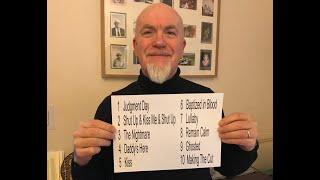How should you react to speech you disagree with? | Nicholas Christakis | Big Think
Description
How should you react to speech you disagree with?
Watch the newest video from Big Think: https://bigth.ink/NewVideo
Join Big Think Edge for exclusive videos: https://bigth.ink/Edge
----------------------------------------------------------------------------------
Defending someone's right to speak does not mean that you have to agree with what they say. The correct response is not censorship, but more discussion.
Physician and sociologist Nicholas Christakis argues that in politics, defending the principle of a contested election is not the same as agreeing with or endorsing a candidate. "We should defend that principle even if we don't like the outcome of the vote."
The best way to test your ideas and beliefs is to argue them against someone with a different stance/point-of-view.
----------------------------------------------------------------------------------
NICHOLAS CHRISTAKIS:
Nicholas A. Christakis is a physician, sociologist, and director of the Human Nature Lab at Yale University, where he is the Sterling Professor of Social and Natural Science. His most recent book is Blueprint: The Evolutionary Origins of a Good Society (March 2019). Follow him on Twitter @NAChristakis
Check Nicholas Christakis's latest book Blueprint: The Evolutionary Origins of a Good Society at https://amzn.to/39Mbb81
----------------------------------------------------------------------------------
TRANSCRIPT:
NICHOLAS CHRISTAKIS: The answer to speech we do not like is more speech. Not censoring the person we don't want to hear or punishing the person we don't want to hear.
There's a difference between defending an important principle and advocating for the implications of that principle. Let me give you a couple of examples. One example is defending the freedom of expression. Even though you disagree with what someone might say when they exercise that freedom. So, for example, I might defend your right to speak. I might defend your right to express yourself without fear of losing your job, for example. But I might still not agree with whatever it is that you're going to say. So you say something I don't like. I don't like it, I respond to it. That's the proper way to handle it.That is to say we defend the right of people to express themselves even though we acknowledge that the outcome of that might not be what we agree with. So the famous saying, of course, is I don't agree with what it is that you want to say but I will defend your right to say it to the death.
Another related example of this, for instance, is the defense of contested elections. We might say we really want if there are going to be important roles in universities or in our society we want free and open elections. And we want contesting candidates. We don't want one candidate that everyone has to either vote for or not vote for. We want elections to be contested. We should defend that principle even if we don't like the outcome of the vote. To defend that principle doesn't mean you're endorsing a particular candidate. It just means you're defending the principle of open contested elections. And if you don't like the fact that someone you don't want might win, the right strategy is not to prevent fair elections. Only in totalitarian or authoritarian governments do we do that. We don't want to risk that someone who we don't approve of will win. Therefore, we don't have free elections. So again, there's often a confusion between defending the principle of free expression or the principle of contested elections and a conflation of those defending the, and a conflation of defending that principle with defending the content of what someone might say or defending the candidates that might be running. Of course those are two very different things.
You test your ideas by arguing with people who disagree with you and actually if you're good at it you even learn to enjoy it. Some of the most fun I have in life is arguing with a good friend of mine who has ideas that are very different than my own. And I enjoy it so much. And often I talk to him and I'm like, you know, he's right. And my beliefs don't have a very sound foundation. And I wouldn't have discovered that if I hadn't actually engaged in an argument with him. And we enjoy each other's company tremendously and he has very provocative ideas. For example, he thinks you should be able to sell your right to vote or he thinks that the citizen should be able to sell who they vote for. And I think this is a totally preposterous idea that it's so anti-democratic and subverts a very key principle of our society. But in arguing with him about this I think I may move the needle a little with him and he makes it harder for me to recognize well what is the source of my belief. What is my objection to his idea. It makes you think harder even about things you take for granted.





















Comments